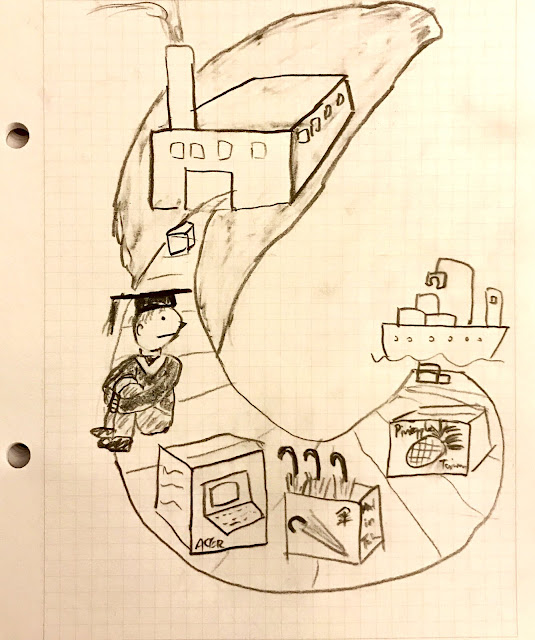為什麼瑞士什麼都要寫三遍 Why writing everything three times in Switzerland makes sense
多元文化和國家競爭力
Swiss multi-culture and competitiveness
Swiss multi-culture and competitiveness
(English version below)
每當坐火車穿越瑞士時,我們都對隨著火車前進方向,而改變的語言感到新奇。火車從巴塞爾出發時廣播是德文,當火車向南穿過弗德堡,店家的招牌跟海報就開始出現法文,而車上的廣播和查票人員也偷偷的換成了法文。
瑞士有三種主要的語言:法文,德文,義大利文。山上的某些村莊還說著傳統語言,羅曼語。有時候我不禁會想這個國家是怎麼運作的?光是把每個官方文件翻譯成三種語言就夠麻煩的。
這個問題在我開始為一間瑞士公司上班時,更加的困擾著我。公司的總部在瑞士德語區,但主要的工廠卻在法語區。每當我參加總部跟工廠的電話會議時都覺得很有趣。主要的對話是用 “英文”,因為我是唯一聽不懂法文跟德文的與會者。但每當有一邊說 “給我們一分鐘討論”他們就會切換成他們的母語,像是法文,然後另一邊就會也趁機用另一種語言,可能是德文來討論別的事情。最後整個會議就變成一盤語言大鍋炒。
照理來說,有一個統一的語言,不是能幫助溝通更有效率,更有競爭力嗎?不是永遠如此的。相反的,我觀察到多樣化反而可以促進組織的進步。
當選擇一個團隊的新成員時,我們通常會喜歡選跟我們相像的人。如此一來,整個組織都有著一樣的思維,所以新的想法很快就能被接受,避免浪費時間爭論。像群居的狼一樣,團隊中的人很快的形成了一起工作的模式。一群有共同想法的人專注在行動,減少無謂的爭吵,這難道不是高效率團隊的模範嗎?
看一個多樣化的團隊工作就完全是另一件事。團隊的成員會花很多的時間討論“事情該怎麼做” 和 “誰的事情優先”。不停地開會去協調事情,把討論過的事翻出來再吵一遍,像是微波昨晚的剩飯剩菜一樣。這一切看起來多麼混亂而沒有效率。
所以,讓多樣化在團隊裡添亂有什麼好處?依我的觀察,多樣化可以讓團隊更能靈活適應外界的變化。
一個同質性高的團隊裡,每一個人會有著類似的看法。這也代表外界的改變或者內部的問題可能會被忽視。當環境改變的時候,同質性高的團隊可能會因為無法察覺,而使其弱點暴露。就算想要改變,同質性高的團體也比較難說服自己去放棄已經付出的心血。這樣的結果,要他們接受改變方向,去適應外界更加挑戰。在這個科技進步速度越來越快的世界,同質性高的團隊也越來越難跟上快節奏的腳步。
事實上,接受我們身邊的不確定性可能是創意的關鍵。在“無知的力量“一書中,作者傑米‧荷姆斯指出一個人可以接受不確定性的程度,影響了他的決策能力。荷姆斯也舉出例子,會說多種語言的人,能夠在大腦內用不同的語言去激發事物的聯想與創意。就像荷姆斯在前言中寫道:
“在一個越來越複雜,不可預測的世界,最重要的事情不是智商,意志力,自信。而是我們怎麼面對我們不了解的事物”
一個多樣化的團隊,就像一座豐富的基因庫。有不同的人帶來對世界不一樣的觀感,給了團隊一個機會去停下來思考。新的觀點被加入團隊時,所產生的內部衝擊,代表著組織正在消化外界來的訊息。團隊成員討論這一個新的訊息,應該是雜訊還是資訊。他們討論是該忽視雜訊,繼續原本的計畫。還是該重視資訊,而改變計畫,或甚至中止原計劃來重新分配資源。
瑞士是被選為最具創新能力的國家之一。我問瑞士同事們,他們認為原因為何,他們說是瑞士的社會安定,吸引了人才與資金。而社會的安定來自於瑞士是由不同族群的人,選擇一起成立的國家。
跟同事們聊完讓我學到,語言不是阻礙進步的障礙。更重要的是人們選擇了相同的目標,並且將他們之間的多樣性,當成進步的動力。
Whenever we take a train and travel through Switzerland, it always fascinates us how the language changes as the train stop goes by. The train announcement starts with German as the train rolls out from Basel. As the train runs South and passes through Fribourg, the shop signs and poster subtly changes into French, and the prerecorded train announcement also switches into French.
Switzerland has three main languages, French, German and Italian, while some village in the mountains still speak traditional Romansh. Sometimes, I wonder how can this country operate? Just the effort of translating every official document three times must be tremendous.
This question also stroked me when I started to work for a Swiss company. The company headquarter is in the German speaking city, while the factory is in the French speaking area. I am often amused when sitting in conference calls between HQ and factory. The main discussion will be in English, for the sake of me being there since I speak neither French nor German. But whenever each side says “give us a minute” for some side discussion they switch into their own mother tongue, like French, and the counter side also uses the time to discuss something on their own in German. Eventually the whole meeting becomes a mixture of different languages.
Surely having one standardised language will help people to exchange ideas faster and communicate more efficiently? Not always so. In fact, I observed that diversity does promote progression, in a way that is sometimes counterintuitive.
When choosing new team members, we tend to choose people we feel alike. As the whole team shares a common mindset, ideas are accepted quicker among the team and less time is “wasted for arguments”. Like a pack of wolves, team members quickly form social norms of how decisions and actions are conducted. Like minded people focusing on actions with less arguments, seems like a formula for a highly efficient teams.
Watching a diverse team in action is a different story. Team members spend significant time debating on “how things should be done”and “which tasks get priority”. Recurrent meetings for “alignment”, and old topics are revisited and heated up again like microwaving leftover food. It all seem so chaotic and unproductive.
So, what good is it for to introducing additional chaos into teams? My observation is diversity allows teams to be more agile and adaptive.
Having everyone view things the same way, means that emerging issues or changes could be overlooked, while no questions are raised. As the environment changes, a homogenous team becomes vulnerable, because they cannot sense that change is coming. Even if they desire to change, a homogenous team is more reluctant than a diverse team to abandon the effort that has been done, and makes the team harder to pivot and adapt to the outside world. As the pace of technology advances accelerates, homogeneous teams will struggle more to keep up with the speed of change in the world today.
In fact, accepting uncertainty around us might be the key to creativity. In his book “Nonsense” Jamie Holmes points out that people’s ability to live with uncertainty, is correlated to better decision making. Holmes also raises examples from multilingual people having better abilities to “juggle” thoughts in different languages in their mind, which encourages lateral thinking and creativity. As Holmes wrote in the prologue:
“In an increasingly complex, unpredictable world, what matters most isn’t IQ, willpower, or confidence in what we know. It’s how we deal with what we don’t understand”
A diverse team works like a gene pool. Having people bringing in new ways to view the world, gives the team a chance to stop and think. As new views are added to the team, internal conflicts arise, which are signs that the team is digesting the signal of changes from the environment. Team members debate whether the new information are noise or signals. They discuss to either ignore the noises and stick to the plan, or recognise signals of change and adapt the plan, or even terminated the plan so resources could be reallocated.
Switzerland is considered as one of the most innovative country. When I ask my Swiss colleagues on what they think the reason is, they say it is the social stability that attracts talent and capital. This social stability comes from the fact that Switzerland is formed by people with different ethnic groups, who made a choice to stick together.
The take away message for me, is that language is not a barrier for progression. What matters more is people choosing the same goal, and appreciate the fact that diversity is the key to progression.
Copyright 2017 EricaShaneView. All rights reserved.




Comments
Post a Comment